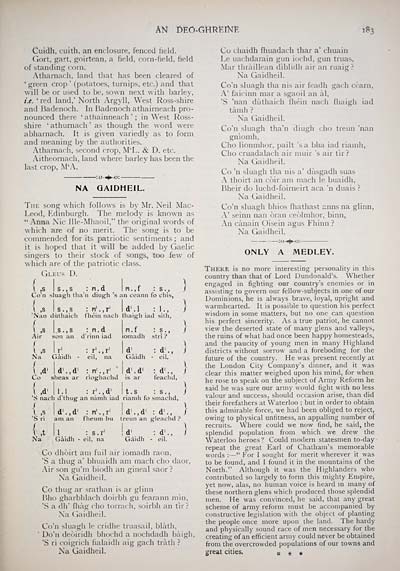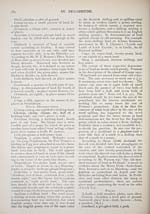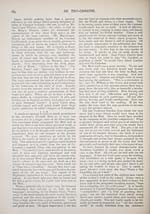Blair Collection > Deo-gréine
(207)
Download files
Complete book:
Individual page:
Thumbnail gallery: Grid view | List view

AN DEO-GHRÈlNF.
i«3
Cuidh, cuith, an enclosure, fenced field.
Gort, gart, goirtean, a field, corn-field, field
of standing corn.
Atharnach, land that has been cleared of
' green crop ' (potatoes, turnips, etc.) and that
will be or used to be, sown next with barley,
i.e. ' red land,' North Argyll, West Ross-shire
and Badenoch. In Badenoch athairneach pro-
nounced there ' athainneach ' ; in West Ross-
shire ' athurnach ' as though the word were
abharnach. It is given variedly as to form
and meaning by the authorities.
Atharnach, second crop, M'L. & D. etc.
Aitheornach, land where barley has been the
last crop, M'A.
NA QAIDHEIL.
The song which follows is by Mr. Neil Mac-
Leod, Edinburgh. The melody is known as
" Anna Nic Ille-Mhaoil," the original words of
which are of no merit. The song is to be
commended for its patriotic sentiments ; and
it is hoped that it will be added by Gaelic
singers to their stock of songs, too few of
which are of the patriotic class.
Gleus D.
f I ' I Ì
I ,s I s.,s : m.d I m.,f : s., J
Co'n sluagh tha'n diugh 's an ceann fo chls,
{ ,s I s.,s : m'.,r' I d'.l : ]., J
'Nan dùthaich t'hein nach fhaigh iad sith.
f
l ,S
Air
/
I ,S
Na
Co
I.S..S
son an
I r'
Gàidh
: n.d
d'rinn iad
: r ,
eil,
I pi. f : s . ,
iomadh stri ?
I d'.,d'
sheas ar
I.I
: pt .,r'
rioghacl
r'.,d'
d'.d 1
is ar
: d 1 .,
feachd,
t.S
'S nach d*thug an nàmh iad ria
I ,s I d 1 . , d 1 : n 1 . , r 1
'S ri am an fheum bu
S .,
macl
d'.,d' : d 1 .,
reun an gleachd ?
,t
: s .:
eil, n;
d 1 : d 1
Gàidh - eil.
Co dhòirt am fuil air iomadh raon,
'S a thug a' bhuaidh am mach cho daor,
Air son gu'm biodh an gineal saor ?
Na Gaidheil.
Co thug ar srathan is ar glinn
Bho gharbhlach doirbh gu fearann nun,
'S a dh' fhàg cho torrach, soirbh an tir?
Na Gaidheil.
Co'n sluagh le cridhe truasail, blàth,
Don deòiridh bhochd a nochdadh bàigl
'S ri coigrich fialaidh aig gach tràth ?
Na Gaidheil.
Co chaidh fhuadach thar a' chuain
Le uachdarain gun iochd, gun truas,
Mar thràillean dìblidh air an ruaig ?
Na Gaidheil.
Co'n sluagh tha nis air feadh gach ccarn,
A' faicinn mar a sgaoil an àl,
'S 'nan dùthaich fhèin nach fhaigh iad
tàmh ?
Na Gaidheil.
Co'n sluagh tha'n diugh cho treun 'nan
gniomh,
Cho lionmhor, pailt 's a bha iad riamh,
Cho cruadalach air muir 's air tir?
Na Gaidheil.
Co 'n sluagh tha nis a' dùsgadh suas
A thoirt an còir am mach le buaidh.
Bheir do luchd-foimeirt aca 'n duais ?
Na Gaidheil.
Co'n sluagh bhios fhathast anns na glinn,
A' seinn nan òran ceòlmhor, binn,
An cànain Oisein agus Fhinn ?
Na Gaidheil.
ONLY A MEDLEY.
There is no more interesting personality in this
country than that of Lord Dundonald's. Whether
engaged in fighting our country's enemies or in
assisting to govern our fellow-subjects in one of our
Dominions, he is always brave, loyal, upright and
warmhearted. It is possible to question his perfect
wisdom in some matters, but no one can question
his perfect sincerity. As a true patriot, he cannot
view the deserted state of many glens and valleys,
the ruins of what had once been happy homesteads,
and the paucity of young men in many Highland
districts without sorrow and a foreboding for the
future of the country. He was present recently at
the London City Company's dinner, and it was
clear this matter weighed upon his mind, for when
he rose to speak on the subject of Army Reform he
said he was sure our army would fight with no less
valour and success, should occasion arise, than did
their forefathers at Waterloo ; but in order to obtain
this admirable force, we had been obliged to reject,
owing to physical unfitness, an appalling number of
recruits. Where could we now find, he said, the
splendid population from which we drew the
Waterloo heroes ? Could modern statesmen to-day
repeat the great Earl of Chatham's memorable
words : — " For I sought for merit wherever it was
to be found, and I found it in the mountains of the
North." Although it was the Highlanders who
contributed so largely to form this mighty Empire,
yet now, alas, no human voice is heard in many of
these northern glens which produced those splendid
men. He was convinced, he said, that any great
scheme of army reform must be accompanied by
constructive legislation with the object of planting
the people once more upon the land. The hardy
and physically sound race of men necessary for the
creating of an efficient army could never be obtained
from the overcrowded populations of our towns and
great cities. » * *
i«3
Cuidh, cuith, an enclosure, fenced field.
Gort, gart, goirtean, a field, corn-field, field
of standing corn.
Atharnach, land that has been cleared of
' green crop ' (potatoes, turnips, etc.) and that
will be or used to be, sown next with barley,
i.e. ' red land,' North Argyll, West Ross-shire
and Badenoch. In Badenoch athairneach pro-
nounced there ' athainneach ' ; in West Ross-
shire ' athurnach ' as though the word were
abharnach. It is given variedly as to form
and meaning by the authorities.
Atharnach, second crop, M'L. & D. etc.
Aitheornach, land where barley has been the
last crop, M'A.
NA QAIDHEIL.
The song which follows is by Mr. Neil Mac-
Leod, Edinburgh. The melody is known as
" Anna Nic Ille-Mhaoil," the original words of
which are of no merit. The song is to be
commended for its patriotic sentiments ; and
it is hoped that it will be added by Gaelic
singers to their stock of songs, too few of
which are of the patriotic class.
Gleus D.
f I ' I Ì
I ,s I s.,s : m.d I m.,f : s., J
Co'n sluagh tha'n diugh 's an ceann fo chls,
{ ,s I s.,s : m'.,r' I d'.l : ]., J
'Nan dùthaich t'hein nach fhaigh iad sith.
f
l ,S
Air
/
I ,S
Na
Co
I.S..S
son an
I r'
Gàidh
: n.d
d'rinn iad
: r ,
eil,
I pi. f : s . ,
iomadh stri ?
I d'.,d'
sheas ar
I.I
: pt .,r'
rioghacl
r'.,d'
d'.d 1
is ar
: d 1 .,
feachd,
t.S
'S nach d*thug an nàmh iad ria
I ,s I d 1 . , d 1 : n 1 . , r 1
'S ri am an fheum bu
S .,
macl
d'.,d' : d 1 .,
reun an gleachd ?
,t
: s .:
eil, n;
d 1 : d 1
Gàidh - eil.
Co dhòirt am fuil air iomadh raon,
'S a thug a' bhuaidh am mach cho daor,
Air son gu'm biodh an gineal saor ?
Na Gaidheil.
Co thug ar srathan is ar glinn
Bho gharbhlach doirbh gu fearann nun,
'S a dh' fhàg cho torrach, soirbh an tir?
Na Gaidheil.
Co'n sluagh le cridhe truasail, blàth,
Don deòiridh bhochd a nochdadh bàigl
'S ri coigrich fialaidh aig gach tràth ?
Na Gaidheil.
Co chaidh fhuadach thar a' chuain
Le uachdarain gun iochd, gun truas,
Mar thràillean dìblidh air an ruaig ?
Na Gaidheil.
Co'n sluagh tha nis air feadh gach ccarn,
A' faicinn mar a sgaoil an àl,
'S 'nan dùthaich fhèin nach fhaigh iad
tàmh ?
Na Gaidheil.
Co'n sluagh tha'n diugh cho treun 'nan
gniomh,
Cho lionmhor, pailt 's a bha iad riamh,
Cho cruadalach air muir 's air tir?
Na Gaidheil.
Co 'n sluagh tha nis a' dùsgadh suas
A thoirt an còir am mach le buaidh.
Bheir do luchd-foimeirt aca 'n duais ?
Na Gaidheil.
Co'n sluagh bhios fhathast anns na glinn,
A' seinn nan òran ceòlmhor, binn,
An cànain Oisein agus Fhinn ?
Na Gaidheil.
ONLY A MEDLEY.
There is no more interesting personality in this
country than that of Lord Dundonald's. Whether
engaged in fighting our country's enemies or in
assisting to govern our fellow-subjects in one of our
Dominions, he is always brave, loyal, upright and
warmhearted. It is possible to question his perfect
wisdom in some matters, but no one can question
his perfect sincerity. As a true patriot, he cannot
view the deserted state of many glens and valleys,
the ruins of what had once been happy homesteads,
and the paucity of young men in many Highland
districts without sorrow and a foreboding for the
future of the country. He was present recently at
the London City Company's dinner, and it was
clear this matter weighed upon his mind, for when
he rose to speak on the subject of Army Reform he
said he was sure our army would fight with no less
valour and success, should occasion arise, than did
their forefathers at Waterloo ; but in order to obtain
this admirable force, we had been obliged to reject,
owing to physical unfitness, an appalling number of
recruits. Where could we now find, he said, the
splendid population from which we drew the
Waterloo heroes ? Could modern statesmen to-day
repeat the great Earl of Chatham's memorable
words : — " For I sought for merit wherever it was
to be found, and I found it in the mountains of the
North." Although it was the Highlanders who
contributed so largely to form this mighty Empire,
yet now, alas, no human voice is heard in many of
these northern glens which produced those splendid
men. He was convinced, he said, that any great
scheme of army reform must be accompanied by
constructive legislation with the object of planting
the people once more upon the land. The hardy
and physically sound race of men necessary for the
creating of an efficient army could never be obtained
from the overcrowded populations of our towns and
great cities. » * *
Set display mode to: Large image | Transcription
Images and transcriptions on this page, including medium image downloads, may be used under the Creative Commons Attribution 4.0 International Licence unless otherwise stated. ![]()
| Early Gaelic Book Collections > Blair Collection > Deo-gréine > (207) |
|---|
| Permanent URL | https://digital.nls.uk/76699970 |
|---|
| Description | A selection of books from a collection of more than 500 titles, mostly on religious and literary topics. Also includes some material dealing with other Celtic languages and societies. Collection created towards the end of the 19th century by Lady Evelyn Stewart Murray. |
|---|
| Description | Selected items from five 'Special and Named Printed Collections'. Includes books in Gaelic and other Celtic languages, works about the Gaels, their languages, literature, culture and history. |
|---|

